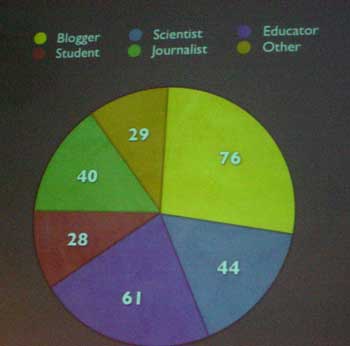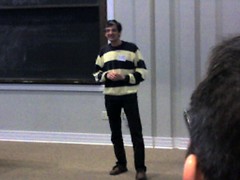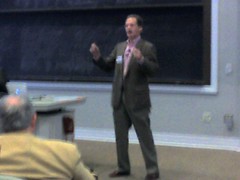[Moblogged]
The conference has begun. Unfortunately, I am not connected to the Internet. They double-checked my Mac number, reset it, and it still hasn’t taken effect. But so far, we’ve received a breakout of the attendees (see graph), and the general rule is golden, “Blog unto others as you would have them blog unto you.”
 Hot dang! I’m online. My friend, Bora Zivkovic is talking about his new book, an anthology of the best science blogs in the past year — and interesting concept. Bora has also compiled a listing of science bloggers from North Carolina and other lists as part of the conference wiki. The page is Science Bloggers.
Hot dang! I’m online. My friend, Bora Zivkovic is talking about his new book, an anthology of the best science blogs in the past year — and interesting concept. Bora has also compiled a listing of science bloggers from North Carolina and other lists as part of the conference wiki. The page is Science Bloggers.
So how do science blogs differ? Well, they are expert blogs, slightly different from journalistic blogs, where people are reporting something that they have found or learned. Science bloggers are blogging from a sense of expertise in the area.  And there is a simple question that is a long-term ongoing concern of scientists. How can we more effectively and efficiently report to the public about the complex world of science? It’s one reason why so many scientists are here in this room.
And there is a simple question that is a long-term ongoing concern of scientists. How can we more effectively and efficiently report to the public about the complex world of science? It’s one reason why so many scientists are here in this room.
Gnome scientists, Hunt Willard is talking about science. When I/we grew up, the space race was always on the television — but did people ever say, “This is science!” Only a fraction of people knew how we were going into space. People simply don’t spend a lot of time imagining what they can’t see — the moon, a single cell, and DNA. But is that important. It was important that people were talking about space exploration, even if they didn’t understand how a rocket works. Perhaps what we don’t need is the glazed eyes that result from our trying to explain how the gnome works. Willard is with the Duke Insitute for Genome Sciences & Policy, which researches but also tries to engage the public with some of the questions that are arising from what we are learning about our selves. These are issues that are going to impact on us, whether we understand the complexities or not.
 We’ve found and sequenced the dna of the Neanderthal. Some people thought, “this is incredibly interesting, fascinating.” Another will say, “What an incredible waste of money!” Others are going to say, “This is a conspiracy, because Neanderthals never existed.”
We’ve found and sequenced the dna of the Neanderthal. Some people thought, “this is incredibly interesting, fascinating.” Another will say, “What an incredible waste of money!” Others are going to say, “This is a conspiracy, because Neanderthals never existed.”
Is no one going to want to clone a Neanderthal. Will it never happen? Do we not want to know what a Neanderthal is like? When we do, what are we going to do? After the experiment is over, what are we going to do with them, euthanasia as with dogs, zoo them like Chimps, or do we find ourselves with another legitimate human race? The are science questions that must engage the public, to support science.
Lesson one! Don’t explain too much. Use the mother rule. How would you explain the science to your mother. (well, my mother is pretty smart, but you get the point). Hunt’s group was the first to produce a completely artificial human chromosome. When it came out in the press, the whole story was about gene therapy – and the public picked that up, resulting in hundreds of letters from people around the world, who are looking for miracles to cure their loved ones. Science can be blown out of proportion.
Now he’s talking about something to do with X chromosomes that is simply to interesting to write about while he’s talking. 😉 Men and women are different. People paid attention. He told a number of other stories that indicated how unpredictable the public’s response to science reporting can be — and scientists like predictability. It is going to take a while for most scientists to get this. Blogging is antithetical to science. What’s critical is the data and interpretations — not the public’s opinion.
A member of the audience is now asking about opinion. Commenters say, “It’s my opinion. I have the same right to my opinion as anyone.” Question? Do people have a right to stupid opinions? Hunt is saying that the key is to create the context that is real and relevant. But sometimes with some people you just can get there (my words). This is a larger issue than science. Part of blogging — part of communication — is creating the context, the scene, the setting.
One of the issues that seems to be especially critical here is the availability of original texts and data. Much of what scientists generate is publicly funded, yet the data is not available to the public, the public is charged again for the data. We all got a T-shirt about it.
Technorati Tags : warlick science education sciencebloggingconference
